

This lesson is about "working in the Netherlands". This is one of the most important lessons for ,many. For some languages there is a short video introduction. Then we will give a more general introduction and the final section includes references to official government sites. These sites contain much more detail and are very important. The first part is a general introduction. Various blocks also include important sentences that you can learn. At the end of this lesson, more language lessons are given.
As an extra we offer some language lessons that are focused on typical sentences related to work.
Go to official sites

jobs
Many people between the ages of 15 and 67,5 are employed. At the age of about 67,5 you can retire.
• Volunteer work: work without salary, but good for experience. For instance helping refugees.
• Temporary work: work for a short period with a salary.
• Permanent work: a permanent job with a salary for a longer period.
• Flexible work: temporary work that never becomes a permanent job (through an employment agency).
• Own company: you do not work for a boss, but are an independent entrepreneur (for example in a shop).
• Black work: working without paying taxes, which is prohibited.
• Part-time: working for less than a full working week, for example 2 or 3 days.
• Full-time: working for a full working week.
• Regular working hours: working at the same times every day.
• Irregular working hours: working at different times, sometimes at night, morning or evening.
• Employer: the boss who pays the salary.
• Employee: the person who works for the employer and receives a salary.
<<<
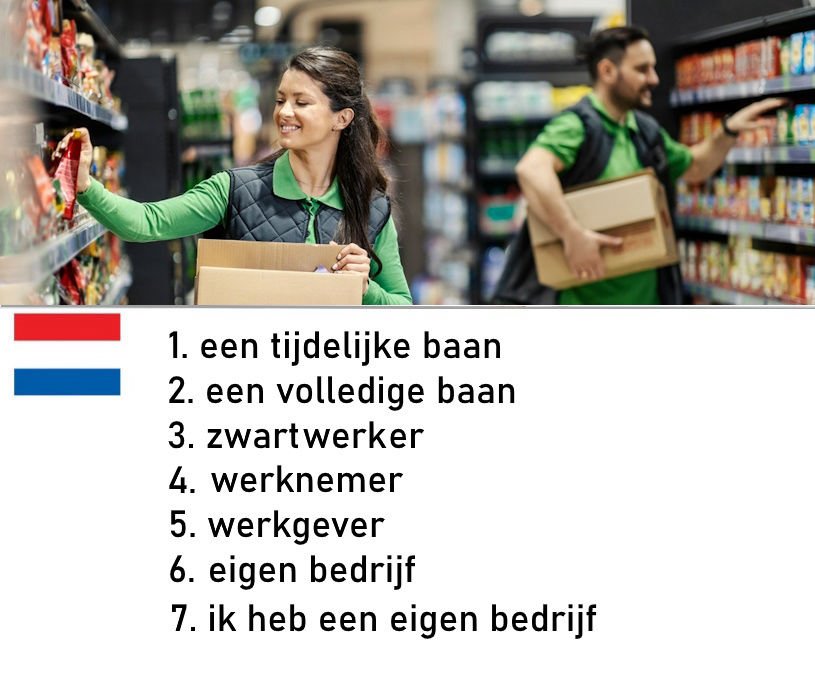
1 a temporary job
2 a full job
3 somebody who works secretly without paying taxes
4 employee
5 employer
6 own company
7 I have an own company
<<<

Applying means trying to get a job. You cannot apply for all jobs. You have to look at what work you like, what diplomas you have, how many hours you want to work and how much you want to earn.
Many people work in the service sector (= you do something for other people).
• Care and welfare: childcare, nursing home, care for the disabled, doctor.
• Technique: car mechanic.
• Construction: painter, carpenter, plasterer.
• Catering: restaurant, cafe.
• Trade and transport: shop, snack bar, bus driver, taxi driver.
• Administrative and security: security guard, secretary.
• Green sector: gardener, farmer.
<<<
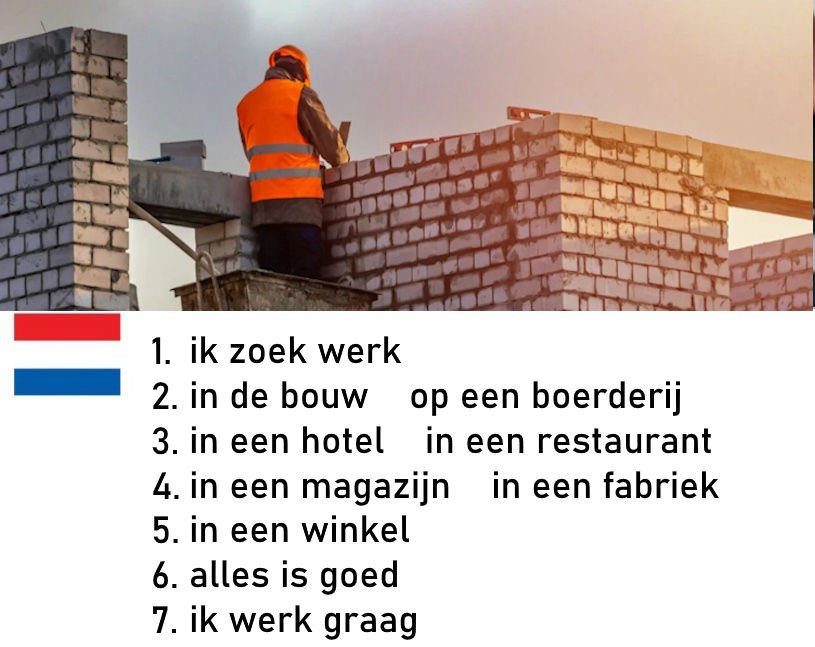
1 I am looking for a job
2 at a construction company on a farm
3 in a hotel in a restaurant
4 in a warehouse in a factory
5 in a shop
6 everything is good
7 I like to work
<<<

Image Description
There may be several reasons why you came to the Netherlands. If a company has invited you, that company will usually also ensure that you receive guidance to obtain the correct permits. It makes quite a difference whether you come from a country that is part of the European Union or a country outside the Union. Then it may be that you first came here as a refugee and that you are now looking for work as a status holder.
It is important that you really have the correct and most recent information at this point and we provide that in the lower part of this lesson.
The following text is therefore more of a general introduction.
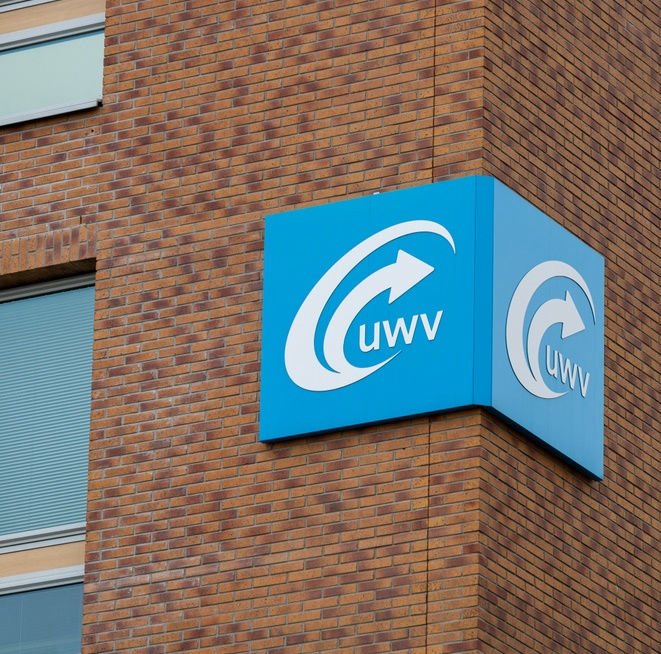
If you are looking for a job, you are a job seeker. Unemployed means you have no job. In the Netherlands if you are unemployed, you must register with the UWV within a few days. The UWV provides a benefit (money if you have no work). You also get a job coach (someone who helps you look for work). A work coach via the UWV can indicate that you have to go to a reintegration company (that gives courses and where you can do an internship for experience).
A benefit = extra support with money
You apply for a benefit at the UWV. You will receive unemployment benefits if you are unemployed and have worked for more than six months. Sometimes people are incapacitated for work (they cannot work due to health problems). These people receive a WIA benefit.
Social assistance benefits are for people who cannot apply for benefits and do not have enough money to live on. This is not a lot of money and it can be difficult to make ends meet.
<<<

employment agency
An employment agency will look for work for you, often temporary work, salary via employment agency. A vacancy or advertisement states the position, the tasks, the job requirements (diplomas, experience, level), working hours, how many hours, which days, the name of the company with address and telephone number and the date on which you must apply. Sometimes the salary is also mentioned.
Before you apply, you can ask the company for information to make sure you really like the job. A CV is a document containing information about yourself (name, address, diplomas, work experience). You write a cover letter to let us know why you want the job (including resume).
<<<

job interview
A job interview is a conversation to see if you get the job. The conversation is important!
You have to prepare well (what do you want to ask?).
• Shake hands when you enter, introduce yourself ('I'm Malek ').
• Please wear smart clothes (no cap).
• Be on time!
• Watch your body language (look people in the eye, sit up straight).
Steps to get a job:
1. You are looking for vacancies.
2. You are looking for information about a company from the vacancy.
3. You send your resume and cover letter.
4. You go to the job interview.
5. You will hear if you get the job.
6. You sign the contract.
7. You start with the job!
<<<

contract
Contract
If you have found work, you will receive a contract. It contains employment conditions (= agreements about the work). How many hours a week you work, what your salary is, whether you have a probationary period, how much holiday you get, and when you start work. Probationary period = trying out the work. You can then resign every day (stop yourself) or be fired (you have to stop).
CAO
CAO is an agreement that applies to large groups
The collective labor agreement contains agreements between all employers and employees for one sector. You have rights (what you get from the boss) and duties (what you have to do for the job).
<<<

You often need a degree. Diplomas from abroad can be evaluated (so you know what you can do with a foreign diploma in the Netherlands). This can be done online.
There is also work for which you do not need a diploma (= unskilled work), such as cleaning work. This job is easy to get, but it doesn't make much money.
<<<

Sometimes you have to follow a course or course, or do an internship.
A reintegration company is a company that helps people find work if they have not worked for a long time (they also teach you how to apply). Another word for "course" is "education":
• Further training: a course to learn something new (learning something new on the job).
• Continuing education: repeating what you have previously learned.
If you are going to do a course, you must register! Sometimes the employer pays, sometimes the tax pays. You will get a job quickly if you have experience. You should always start low, but later you can level up. Qualities are what you are good at and what your character is (reliable, flexible, creative).
Motivation is why you want that job. You often have to say this during a job interview (I like working with people).
<<<

Image Description
Someone can become an independent entrepreneur (= start his own company). You are then the boss yourself. Hard work and good organization = earn a lot of money. Sickness or vacation = no money!
What do you need?
• Diplomas (and courses)
• Own money (and being able to borrow money from the bank)
• Write a business plan (= it states what you want to do and how you are going to do it). The bank wants to know what your plan is! If you start your own company, you must register with the Chamber of Commerce (= an organization that helps companies). They check whether a company operates according to the rules of the law. They provide information about tax, courses and the business plan.
• Paying tax and premiums Your salary is stated on your payslip. Net salary is the amount you receive in your bank account, without taxes. Gross salary is the total salary, including taxes, from which taxes are still to be deducted.
• Suppose your salary is €1600 gross and €1200 net. In this case you pay €400 in taxes and premiums.
• Tax is an amount that you pay to the government, which they use to finance roads, schools, the police and benefits, for example. You pay premiums for insurance policies related to your work, such as pension, unemployment and disability.
Taxes
Once a year you will receive an annual statement stating your gross and net salary for the past year. You can use this document for the tax return that you must submit on March 1. Sometimes you get money back.
• A union can help you as an employee. For example, they negotiate salaries with the employer, discuss terms of employment and offer assistance in conflicts. In addition, they provide information about everything that has to do with work. Joining a union costs money.
• A works council (OR) is a group of people at work who are allowed to make decisions about the employer's plans. They also make new plans. A company with more than 50 employees must have a works council.
• The Working Conditions Act is there to ensure that people work in a healthy and safe manner. Some professions require special safety measures, such as wearing a helmet in construction. If you feel that your work is not healthy or safe, you should discuss it. The works council must look into this in the company.
<<<

having fun
You work together with colleagues and sometimes have a work consultation or meeting in which you talk about the work, make plans and discuss problems. In a company, every department has a manager. The director is the boss of the executives. You talk differently with your manager than with your normal colleagues.
• Colleagues make work more fun and easier. You help each other, talk to each other and compliment each other. Many companies have a staff association that organizes fun activities, such as parties or bowling.
• You are likely to make mistakes in the beginning because you are still learning. Ask for help and be open to criticism. Talk to your manager. A performance review is a conversation with your manager about how the work is going and what could be improved.
• It is normal to make mistakes in the beginning because you are still learning. It's important to ask for help and be open to criticism so you can do your best. It's good to talk to your boss.
• A performance review is a conversation with your boss about how you do your job and what could be improved.
• Sometimes there is discrimination if you are a foreigner, for example if you are Muslim and colleagues are annoying when you want to pray. It is important not to get angry easily, because sometimes it can be a joke. If it doesn't stop, it's good to talk to the colleague first. If that doesn't help, you can make an appointment with the chief or director. Discrimination is prohibited and you have the right to do something about it. You can always report this to the police.
<<<
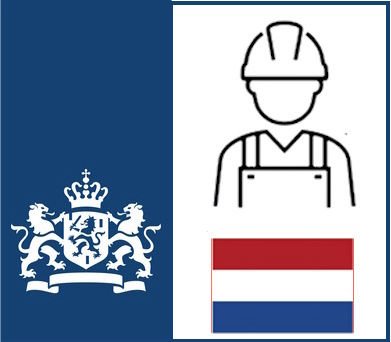
Dutch
1. contract en lonen
2. werken als zelfstandige
3. gezond en veilig werken
4. ontslag
5. vrije dagen en verlof
6. belastingen en toeslagen
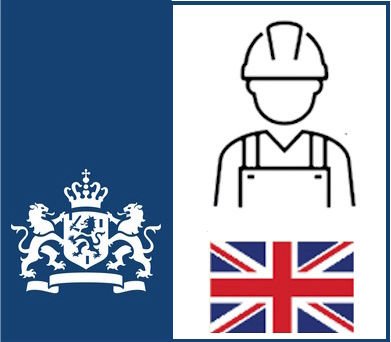
English
1. contract and wages
2. self-employment
3. working healthily and safely
4. dismissal
5
Some important sentences
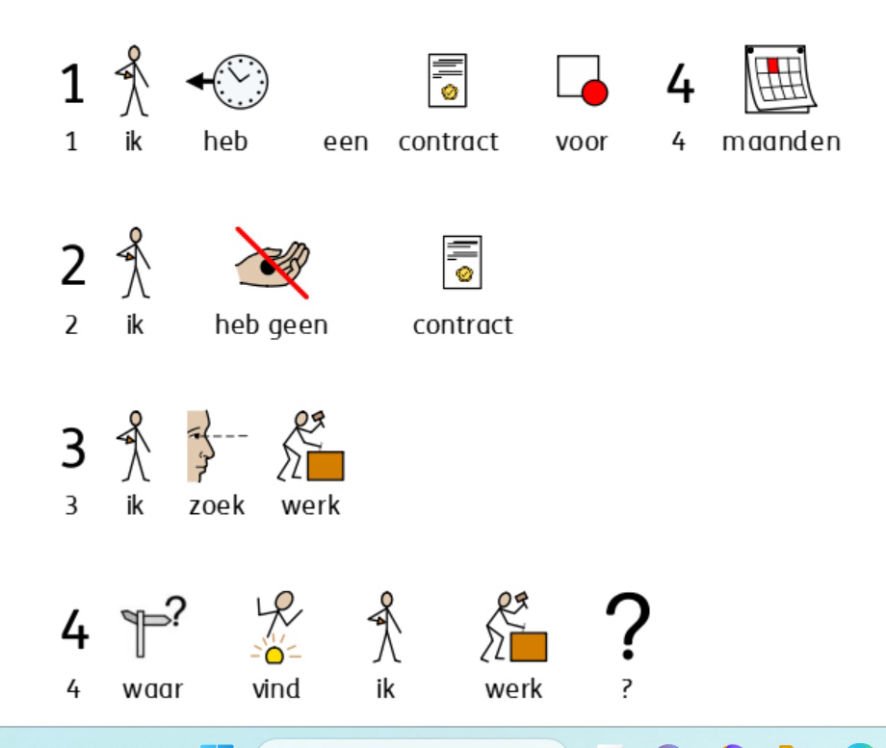
dokter
ik ben ziek
ik heb koorts
ik voel me niet goed
ik heb pijn
hier
ik ben misselijk
ik ben moe
<<<
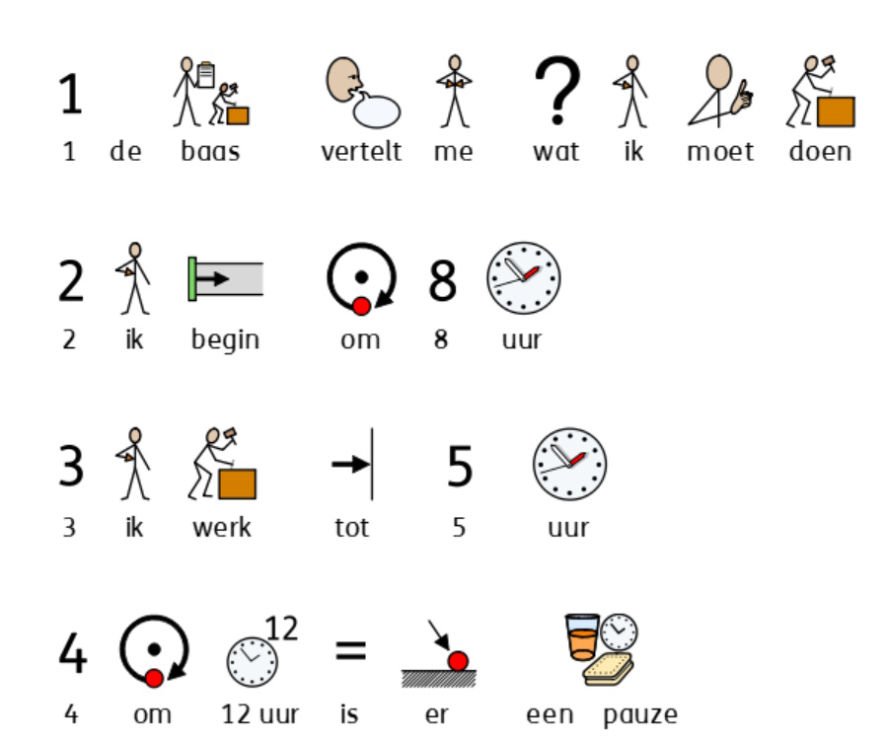
dokter
ik ben ziek
ik heb koorts
ik voel me niet goed
ik heb pijn
hier
ik ben misselijk
ik ben moe
<<<
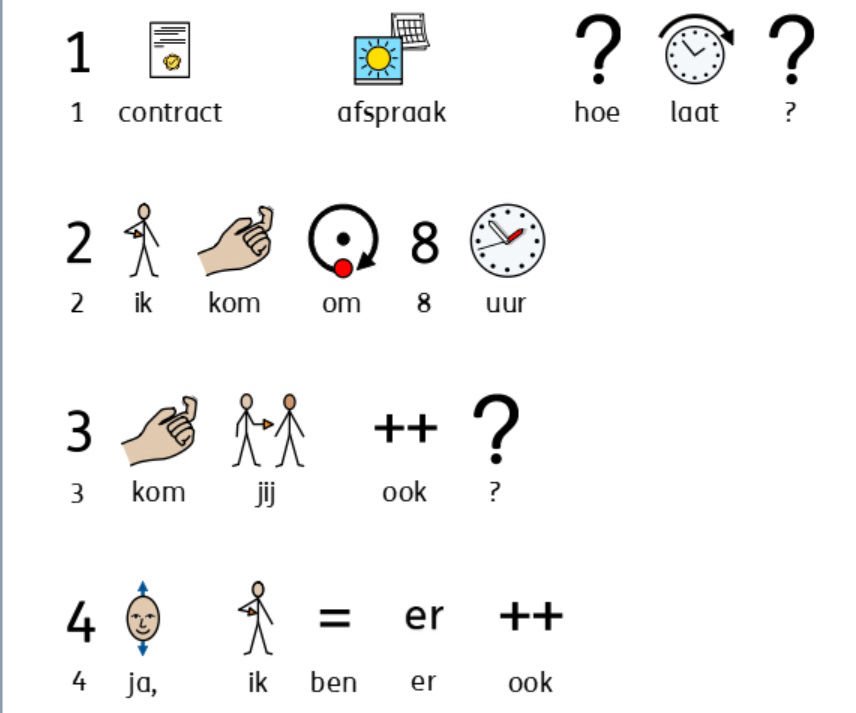
dokter
ik ben ziek
ik heb koorts
ik voel me niet goed
ik heb pijn
hier
ik ben misselijk
ik ben moe
<<<
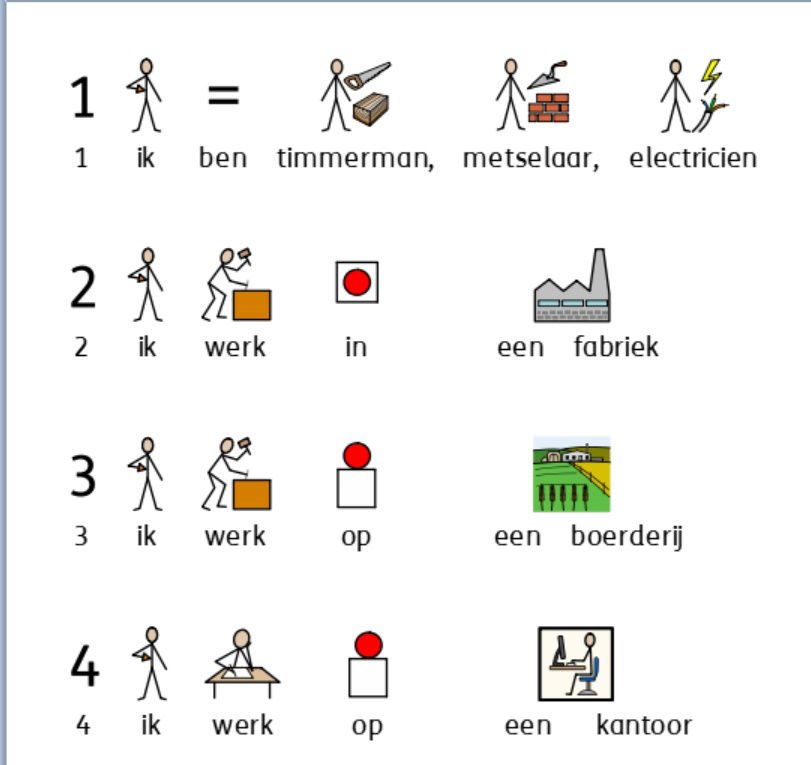
dokter
ik ben ziek
ik heb koorts
ik voel me niet goed
ik heb pijn
hier
ik ben misselijk
ik ben moe
<<<
Website was created with Mobirise